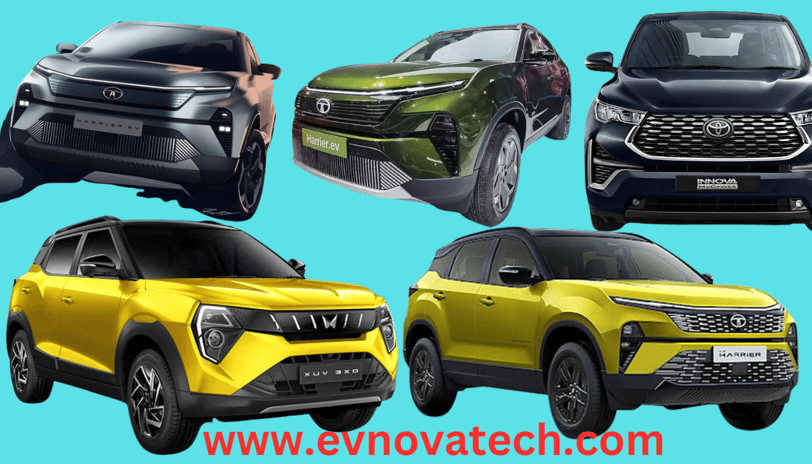"India’s EV Revolution 2025: Top Affordable Electric Cars That Will Change the Game!"
2025 marks a transformative year for India’s automotive industry as mass-market electric vehicles hit the roads. From Maruti’s e Vitara to Tata’s Harrier EV, discover the top upcoming EVs that promise affordability, innovation, and eco-friendliness.
BLOG POSTEVS NEWS
evnivatech.com
12/27/20244 min read


"India’s EV Revolution 2025: Top Affordable Electric Cars That Will Change the Game!"
Introduction
2025 is set to be a landmark year for India’s automotive landscape, heralding a wave of innovation and sustainability in the form of affordable mass-market electric vehicles (EVs). With global trends pushing toward cleaner energy, Indian automakers like Tata and Mahindra have already laid the groundwork for an electrifying future. Now, the year promises even greater advancements, as household names like Maruti, Hyundai, and Toyota prepare to unveil their debut EVs.
This comprehensive guide explores the top EVs expected in India in 2025, detailing their features, expected prices, launch dates, and more. These EVs are not only a testament to the evolving automobile industry but also an indication of India’s commitment to a sustainable future.
1. Maruti Suzuki e Vitara
Expected Launch: January 2025
Expected Price: From Rs 22 lakh (ex-showroom)
Maruti Suzuki, India’s beloved auto giant, steps into the EV market with the much-anticipated e Vitara. Recently teased at the Bharat Mobility Global Expo 2025, the e Vitara’s production model has already created waves of excitement among consumers and industry experts alike.
Key Features:
Dual integrated screens and wireless phone charger for seamless connectivity.
Fixed panoramic glass roof and 6 airbags, prioritizing style and safety.
Advanced Driver Assistance Systems (ADAS) for enhanced driving support.
Claimed range: 550 km with 49 kWh and 61 kWh battery packs.
Maruti’s entry into the EV space is a bold step, aiming to combine luxury, performance, and eco-conscious driving for Indian consumers. The e Vitara sets the stage for a competitive EV market, offering top-tier features at an accessible price point.
2. Hyundai Creta EV
Expected Launch: January 17, 2025
Expected Price: Rs 20 lakh
Hyundai brings the popular Creta into the EV fold, retaining its iconic design essence while giving it a futuristic twist. Test mules have already revealed a resemblance to its ICE sibling, with subtle yet impactful changes to distinguish the electric version.
Key Features:
Dual 10.25-inch screens and dual-zone AC for premium cabin experience.
Ventilated front seats and an 8-speaker Bose sound system for added luxury.
Level 2 ADAS and a 360-degree camera, ensuring safety and convenience.
Claimed range: Approximately 400 km on a single charge.
With its blend of luxury, performance, and affordability, the Hyundai Creta EV promises to be a game-changer in the mid-range EV segment.
3. Tata Harrier EV & Tata Safari EV
Harrier EV Expected Launch: January 2025
Safari EV Expected Launch: February 2025
Expected Prices: Rs 30 lakh (Harrier EV), Rs 32 lakh (Safari EV)
Tata Motors continues its EV legacy with two powerhouse SUVs—the Harrier EV and Safari EV. Both models are packed with cutting-edge features, aiming to redefine electric SUV standards in India. These SUVs cater to consumers seeking robust performance and luxurious comfort.
Key Features:
12.3-inch touchscreen infotainment and 10.25-inch digital driver’s display for advanced connectivity.
Gesture-enabled powered tailgate and mood-lit panoramic sunroof for premium convenience.
Claimed range: Over 500 km with potential AWD dual motor setup for exceptional performance.
With these offerings, Tata Motors reinforces its position as a leader in India’s EV market, setting new benchmarks for innovation and sustainability.
4. Hyundai Venue EV
Expected Launch: April 2025
Expected Price: Rs 12 lakh
Hyundai adds another feather to its EV cap with the Venue EV. Expected to be the most affordable in Hyundai’s electric lineup, this compact SUV caters to budget-conscious buyers while maintaining the brand’s hallmark quality.
Key Features:
Compact yet modern design mirroring its ICE counterpart, ensuring familiarity with innovation.
Multiple battery options with an estimated range of 300-350 km, ideal for daily commuting.
Practical yet stylish, perfect for urban and suburban users.
The Venue EV stands as a testament to Hyundai’s ability to democratize EV technology without compromising on quality or performance.
5. Kia Carens EV
Expected Launch: April 2025
Expected Price: Rs 20 lakh
Kia ventures into uncharted territory with the Carens EV, a family-friendly MPV designed for versatility and comfort. Based on the standard Carens, the EV version aims to bring innovation to India’s MPV segment.
Key Features:
Dual 10.25-inch digital displays and ventilated front seats for an upscale experience.
Estimated range: 400-500 km with a single motor setup, ensuring efficiency and reliability.
Wireless phone charger and sunroof, catering to modern family needs.
The Carens EV positions itself as a unique offering, blending practicality with forward-thinking technology.
6. Mahindra XUV400 EV / Toyota Urban Cruiser EV
Expected Launch: Mid-2025
Expected Price: Rs 20-25 lakh
Both Mahindra and Toyota bring their A-game with the XUV400 EV and Urban Cruiser EV, respectively. While Mahindra expands its EV lineup, Toyota’s Urban Cruiser serves as a rebadged version of Maruti’s e Vitara, leveraging shared technology and design.
Key Features:
Shared amenities: Dual screens, wireless charger, and 360-degree camera for superior functionality.
Claimed range: Around 550 km with 49 kWh and 61 kWh battery packs, ensuring extensive travel capabilities.
